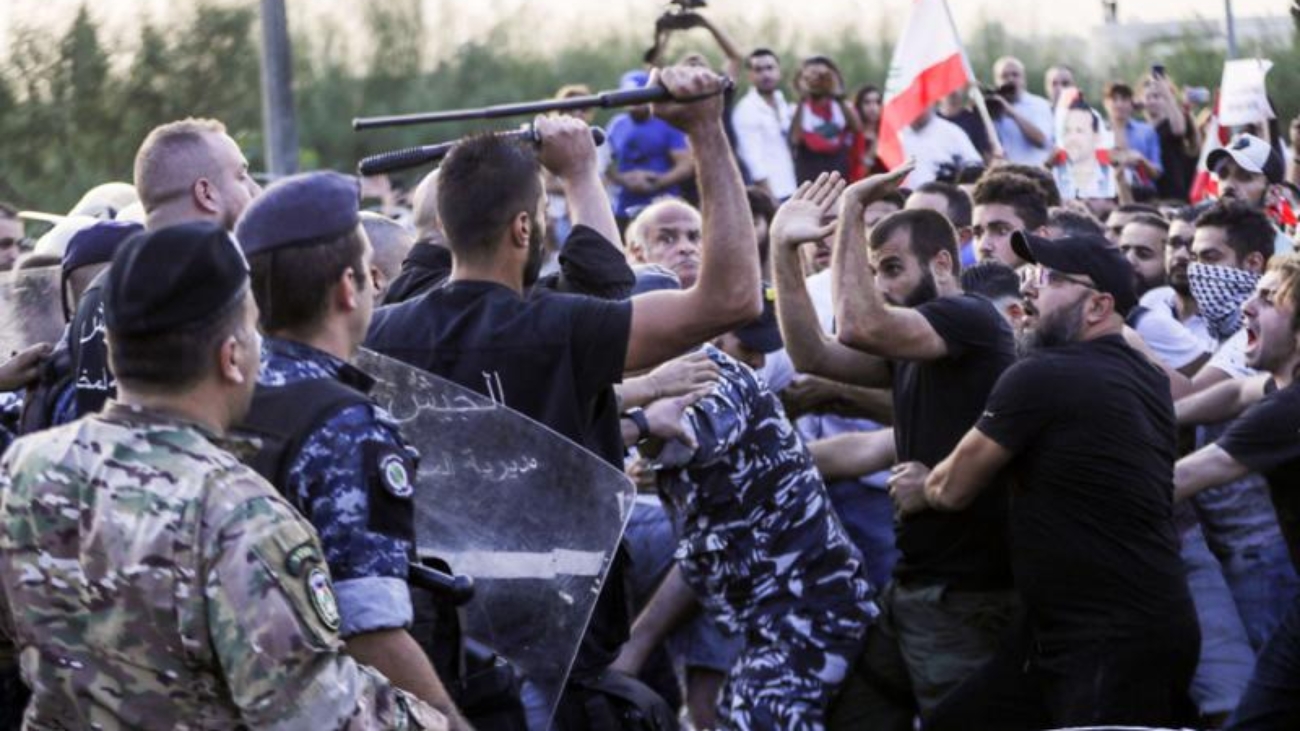By: Simon Speakman Cordall
This piece was originally published on the thearabweekly website https://thearabweekly.com/
TUNIS – As predominantly young demonstrators have taken to the streets across Lebanon calling for an end to the country’s confessional system of government in which posts and ministries are divided along sectarian lines, the sense of identity that has underpinned Hezbollah and its ally Amal’s rise has come under repeated attack.
The cross-sectarian nature of the protests took many among Lebanon’s ruling elite, more accustomed to attributing blame across confessional lines than defending the system of government, by surprise. Protesters from all sects — Sunni, Druze, Shia and Christian — have rebelled against a political elite they see as having enriched itself at the country’s cost.
For Hezbollah, which has relied on an ingrained sense of Shia identity, the problems are acute. Responding to the groundswell of popular discontent, Hezbollah Secretary-General Hassan Nasrallah appeared to open the door to corruption investigations while maintaining his defence of the political status quo and particularly the group’s allies within the Shia Amal Movement.
Speaking to the Daily Beast, a Hezbollah member who fought in Syria in support of Syrian President Bashar Assad said the challenges of defending the movement and denying the demands of protesters were manifest.
“Am I a member of Hezbollah against the Israelis? Yes, I am,” the fighter, identified as Abu Hussein, said. “Am I a member of Hezbollah when it’s against the people in the streets? No!”
“The protesters’ demands are 100% legitimate and they have no other choice to get their demands met,” he told the Daily Beast, suggesting that an increasing number of fighters held similar views.
“Hezbollah built itself up into a formidable power in large part by portraying itself as a defender of the Lebanese people against Israel,” said Thomas Abi-Hanna, a security analyst with the risk consultancy Stratfor. “The group’s sole focus was defending Lebanon. Hezbollah’s activities in Syria, in which it fought to defend the Syrian government of Bashar Assad, undermined that image in the eyes of some Lebanese.”
Since its foundation, Iran has played a pivotal role in Hezbollah’s development, providing arms to the group through Syria and overseeing its deployment in that conflict. As in other countries across the region, that influence is being challenged. “Iran is watching the events with great interest. However, Lebanese protests are likely the third-most important protest movement to Iran, which also faces problems closer to home including massive protests within its own borders as well as large scale protests in neighbouring Iraq,” Abi-Hanna said.
However, predictions that the protests might inflict long-term damage to Hezbollah’s support in Lebanon appear flawed.
“There has been a lot of speculation recently about the level of control Hezbollah and Amal maintain over Shias given the multiple demonstrations that happened in places considered as the stronghold of these two parties,” said Elie Abouaoun, director of the MENA programme at the US Institute of Peace.
“Undeniably, a number of both parties’ supporters went on the streets and complained about the lack of services and economic opportunities. However, this uprising in the parties’ fiefs is more about the economic and social conditions than it is about the political options of these parties.”
Abouaoun said that, after decades of political exclusion, many Lebanese Shias hold that Hezbollah remains the only route to political representation and protection.
“While this might shift to become less of a priority in the context of acute economic and social hardship,” he said, “it does not disappear completely and will re-emerge when relevant. So, in a nutshell, this erosion is easily reversible unless a miracle happens, i.e. building a political system and state institutions that would dismiss their concern.”
It has been suggested that the extent to which Hezbollah would be open to corruption investigations may be limited. While accusations against Hezbollah officials have been limited, those against their allies are widespread.
“Hezbollah’s main allies in Lebanon, starting with Amal, are heavily involved in corruption. Therefore, going after (corruption) will lead to a sharp divide between Shias, which is the last thing Hezbollah would want now,” Abouaoun said.
“Fighting corruption will involve as well targeting key figures in another heavyweight ally, the Free Patriotic Movement, some of which are also involved in malpractices and abuse of power.”
Hezbollah’s position cannot be assured. “Even within its own ranks and despite a strict discipline there have been more than one case of corruption reported. There is no doubt that this is only the emerging part of the iceberg and that a serious investigation will disclose more about the involvement of key figures in Hezbollah in corruption,” Abouaoun said.

